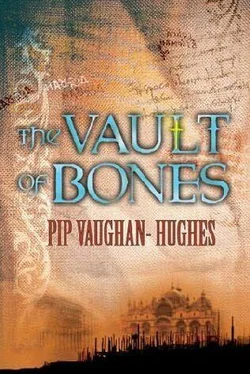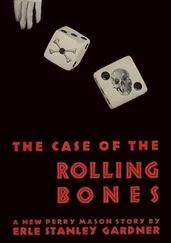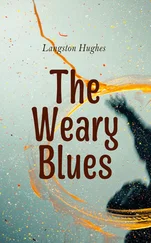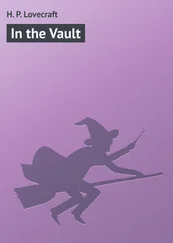Pip Vaughan-Hughes - The Vault of bones
Здесь есть возможность читать онлайн «Pip Vaughan-Hughes - The Vault of bones» весь текст электронной книги совершенно бесплатно (целиком полную версию без сокращений). В некоторых случаях можно слушать аудио, скачать через торрент в формате fb2 и присутствует краткое содержание. Жанр: Исторический детектив, на английском языке. Описание произведения, (предисловие) а так же отзывы посетителей доступны на портале библиотеки ЛибКат.
- Название:The Vault of bones
- Автор:
- Жанр:
- Год:неизвестен
- ISBN:нет данных
- Рейтинг книги:4 / 5. Голосов: 1
-
Избранное:Добавить в избранное
- Отзывы:
-
Ваша оценка:
- 80
- 1
- 2
- 3
- 4
- 5
The Vault of bones: краткое содержание, описание и аннотация
Предлагаем к чтению аннотацию, описание, краткое содержание или предисловие (зависит от того, что написал сам автор книги «The Vault of bones»). Если вы не нашли необходимую информацию о книге — напишите в комментариях, мы постараемся отыскать её.
The Vault of bones — читать онлайн бесплатно полную книгу (весь текст) целиком
Ниже представлен текст книги, разбитый по страницам. Система сохранения места последней прочитанной страницы, позволяет с удобством читать онлайн бесплатно книгу «The Vault of bones», без необходимости каждый раз заново искать на чём Вы остановились. Поставьте закладку, и сможете в любой момент перейти на страницу, на которой закончили чтение.
Интервал:
Закладка:
I crossed the Campo dei Fiori and headed towards the Jewish Quarter, for I was in the mood for the good fried fish that I knew could be found there. And I loved this part of the city, with its different sights and smells, and its sense of otherness, which reminded me of the Cormaran. I found a cook-shop selling red-hot fillets of some firm white fish and ambled through the streets, nibbling carefully on the searing morsels and looking idly at the life around me. It was thus that my feet led me to one of my favourite sights, the fish market on the steps of the Church of Sant’Angelo which stands in the shadow of the palace of the Savelli, everything in turn overhung by the ruinous, marble-tumbled bulk of the Capitoline Hill. The worthy canons of the church rented out their stone steps to the fishmongers of Rome, and it made for the oddest scene imaginable, at least to my eyes. I had come down here before just to watch the fun: the fish of all shapes and sizes, laid out on the worn marble; mounds of shells, buckets of writhing eels and seething elvers; crates and baskets of the oddest creatures from the deep pastures of the sea. In the air a stench of fish-guts and a babel of voices, greeting, haggling, arguing, protesting. It seemed to me an eminently sensible use of church steps. This morning the melee was in full swing, and I sat down on a piece of old column to watch.
The spectacle did not disappoint. A ruinously fat woman in the clothes of a wealthy dowager was engaged in a mighty tongue-lashing contest with a small, swarthy fishmonger. Both stood, hands on hips, and excoriated each other on some subject I could not hear, but which I assumed was piscatorial in nature. And indeed, growing tired of words, the woman hitched up her sleeves to reveal great doughy arms, bent down, and came up grasping a vast and grotesque creature, a spider-crab whose body was as big as the fishmongers head and whose claw-tipped, hairy arms splayed out, waving feebly, like the rays of a blasphemous halo. For an instant I thought she was going to drop the thing on to the man's head, but instead the merchant threw up his arms, they both laughed, and in another instant the man was tying the poor crab's weakly protesting legs together with a length of twine and placing it carefully in the woman's basket.
This was better than a puppet show. I went over to examine the wares on display. Here was a crock full of cuttlefish, all nacreous ooze and popping, ink-teared eyes. A pan full of eel-like creatures with long, sword-like beaks looked naked, visceral. I admired the golden bream and the night-striped mackerel. Enough, then: I was hungry again, and I had it in mind to take a last stroll around the ruins of the Campo Vaccino as well. There was a smell of grilling fish in the air, and I located its source: a stall behind me, over by the Palazzo Savelli. I went to investigate. Sardines: fresh and succulent, the man informed me. I was just handing over my coin when, over the grill-man's shoulder, I happened to glance over at the shadowy arches of the palazzo. A gang of urchins, cruel and noisy, were hunting fat fish-market cats in the shade, and their hoots and halloos were echoing off the stones. I was idly following the proceedings when my eye caught sight of a face in the shadows, for a spear of sunlight lay across it, catching the yellow hair and an oblique slash of face: a hint of an eye, the tip of that unmistakable nose. It was the woman from the White Hound, from Baldwin's chambers.
My heart jumped, and several thoughts flew up at once: what happenstance; she followed me; she has come to buy fish, of course. I blinked and set down my coin, and in the time it took for me to grab my leaf-plate of fish, she had vanished. Ah, then it had been an illusion. Rome, I was finding, was apt to play tricks upon the mind, especially those fevered with a newly resurgent lust. I shook my head ruefully and walked over to the palazzo, just to make sure. And indeed the curved, cloister-like space behind the arches was empty of blonde women. But it was full of screeching children with the scent of cat blood in their noses, so I moved on.
I spent the next hour clambering over the ruins in the Campo Vaccino, the very heart of the world when Caesar ruled it, but which was now half weed-choked desolation and half cattle market. It was also a crucible of the sun's scorching heat, and so I tired of poking through the bramble-carpeted motley of foundation walls and collapsed pillars. With nothing to occupy them, my thoughts had begun to turn again and again to the wench in Baldwin's chambers. I rolled her image around in my head, toying with it as a kitten plays with a vole: first touching, then patting, then batting, then licking, and then devouring it, until it had become such a vivid daydream that only when I tripped over a half-buried column and and scraped my hands did I come to my senses. So I said farewell to the ruins and climbed the hill to the Campidoglio, and thence down into the familiar tangle of the Campus Martius.
I wanted to visit my favourite place in the city once more before I left, and so a little before None I arrived before the Church of Santa Maria of the Martyrs. From the Mirabilia, I knew its true name to be the Pantheon, and indeed the great portico, with its inscription to Agrippa, seemed like the entrance to no church I had ever known, even in this city of confounding discoveries. But it was not the outside that had drawn me here again and again in the past weeks, but what lay within, through the mighty bronze doors.
It was almost empty inside, save for a nun sweeping the floor and a verger talking with two monks against the far wall. As I always did, I paused on the threshold before setting out into the great well of dusty light, padding across the marble and feeling the round walls rise around me, letting my head fall back as I walked until I was in the centre of the floor and gazing straight up at the sky through the perfect circle of the oculus. There I stood, seeing nothing but that disc of purest blue hanging at the apex of the domed roof, and all around it the squares within squares that made up the dome, carved from stone but seemingly weightless. A pigeon fluttered to and fro across the shaft of sunlight that angled down towards me. Sparrows twittered faintly out in the portico. I breathed in the cool air, and felt the hair on my head rise ever so slightly, as it always did in this spot. For here, I was sure, was the centre of the world, the point on which everything turned. Here was stillness, utter calm, the axis: around me, the seas, the countries at war and peace, the fretful seas, the clouds, the stars in their spheres spun and danced.
The nun began coughing horribly behind me, wet, wracking spasms. I sighed and looked down. The marble walls in all their colours glimmered. I rubbed my eyes: I had walked far today, and I realised I was tired. The nun coughed again. I glanced over. There she was, hunched over her broom, shoulders heaving. The verger was also regarding her with irritation. And further around the curving walls, a woman in a tunic of silvery linen, whose yellow hair fell straight behind her back. This time she was no illusion: the monks were watching her too. She caught my gaze, and began to edge along the wall towards the door. She walked, step by cautious step, and I turned in place, still the axis, still caught under the eye of heaven. Through the golden half-light she slipped, past empty niches and tombs, past the nun, recovered now; I turned, and she reached the door and darted outside.
Released by the oculus, I took to my heels after her, ignoring the throaty admonitions of the nun. But out in the piazza I found only the dun-coloured flocks of pilgrims circled by sharp-eyed Roman wolves. I looked about me in a frenzy: where had she gone? I chose an alleyway at random, and ran up it until I reached a little church, around which the streets diverged in three directions. It was hopeless: she had probably not even come this way, I told myself. But she had followed me after all, for happenstance does not strike the same two people twice in as many hours. Why? I leaned against the church wall, panting.
Читать дальшеИнтервал:
Закладка:
Похожие книги на «The Vault of bones»
Представляем Вашему вниманию похожие книги на «The Vault of bones» списком для выбора. Мы отобрали схожую по названию и смыслу литературу в надежде предоставить читателям больше вариантов отыскать новые, интересные, ещё непрочитанные произведения.
Обсуждение, отзывы о книге «The Vault of bones» и просто собственные мнения читателей. Оставьте ваши комментарии, напишите, что Вы думаете о произведении, его смысле или главных героях. Укажите что конкретно понравилось, а что нет, и почему Вы так считаете.









